






































The ABCC’s first major event of the year was an exceptionally successful business seminar held in cooperation with DMCC and the Embassy of the UAE in the UK at our premises on the evening of 23 January 2024. The meeting attracted around 250 senior business delegates and guests including diplomats and top executives.


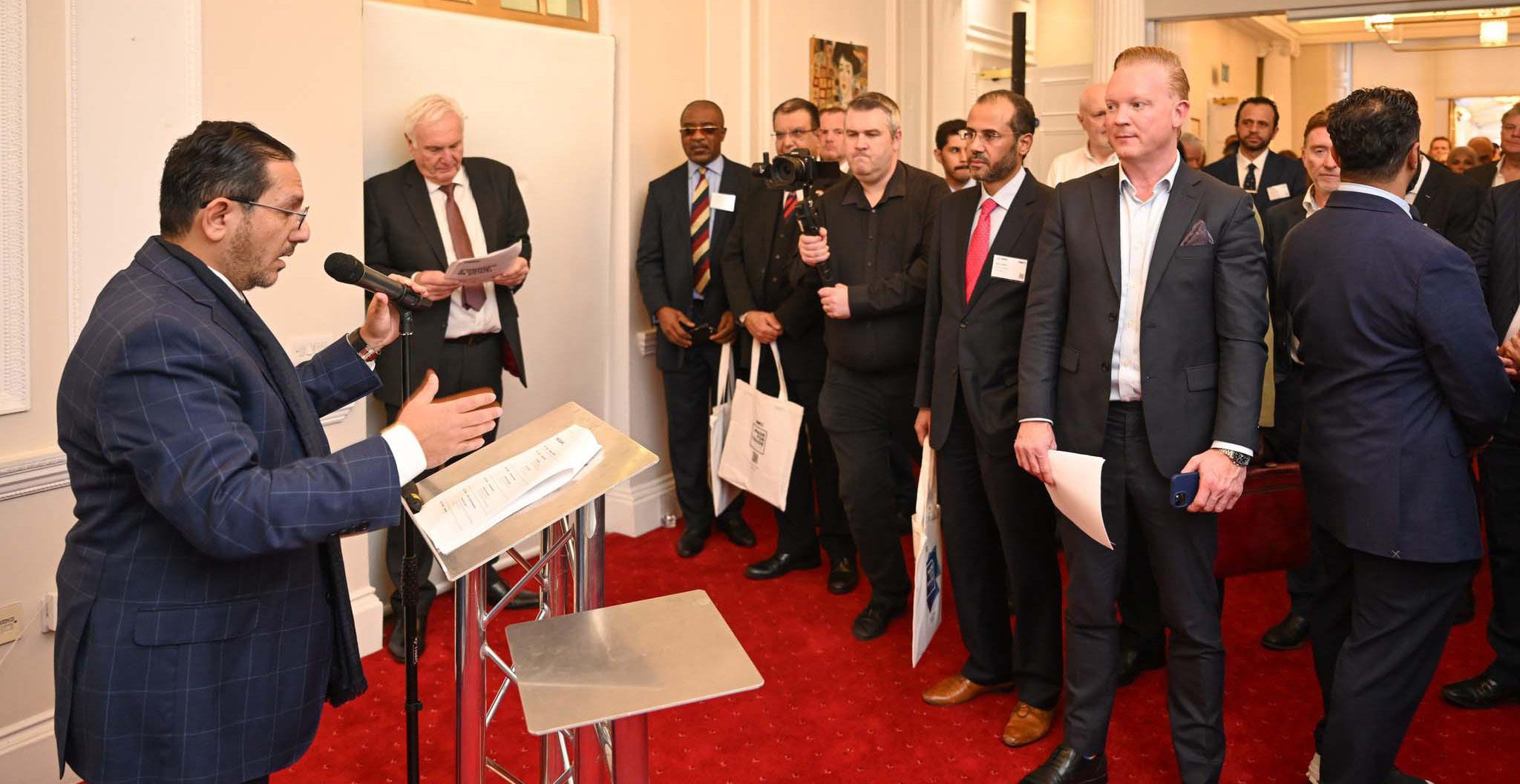
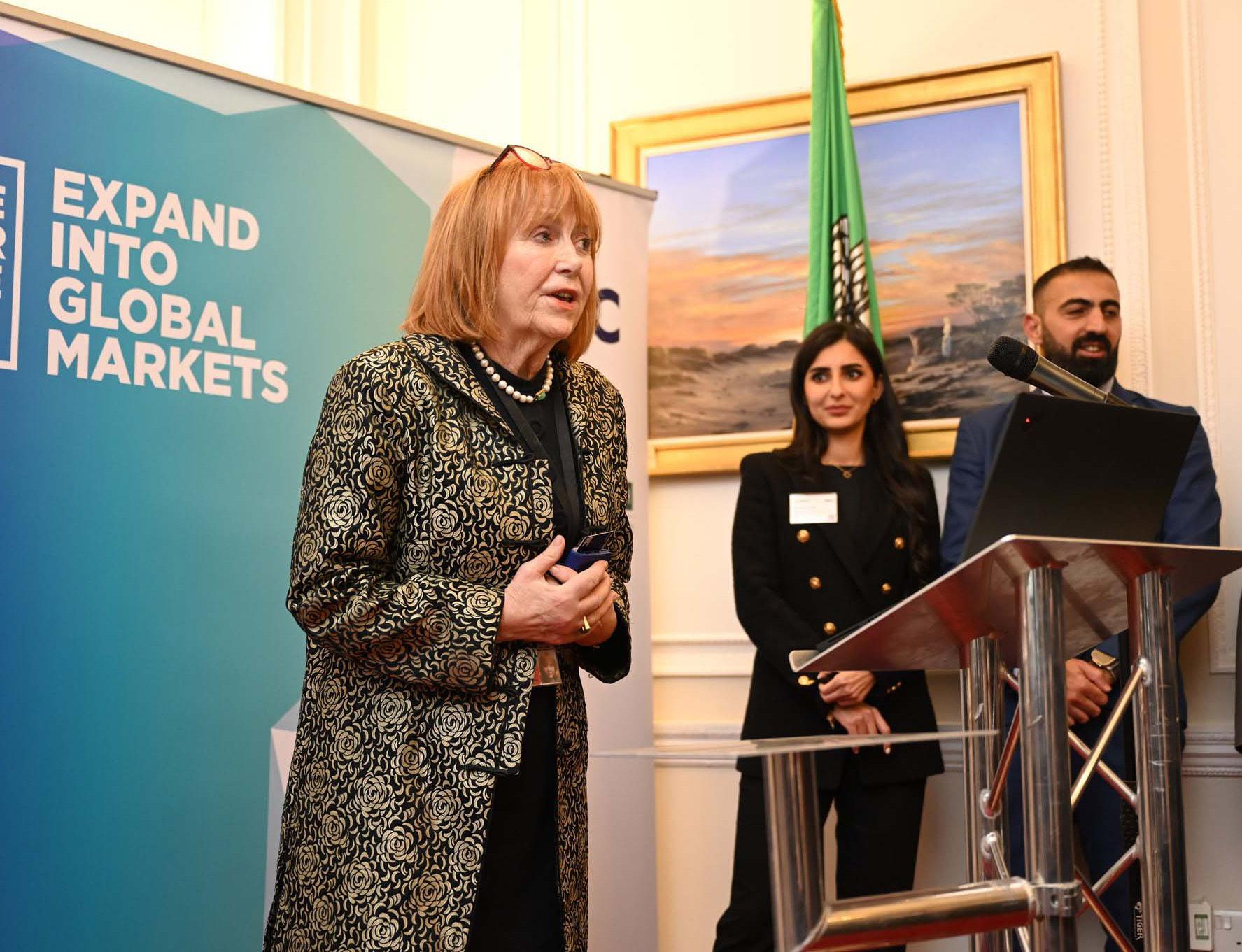



The DMCC is a global trade powerhouse and an agency of the Government of Dubai.
Speakers and delegates were welcomed to the ABCC Mayfair premises by Mr Bandar Reda, Secretary General & CEO, who described it as an honour and privilege to host the DMCC.
The Rt Hon Baroness Symons of Vernham Dean, ABCC Chairman, interrupted her hectic parliamentary schedule, to deliver welcoming remarks where she lauded the excellent bilateral relations enjoyed by the UK and the UAE and looked forward to further improvements.
The high level discussion introduced the latest developments and opportunities available in the DMCC for commodities trading and doing business in the Gulf more generally. Keynote speaker was Mr Ahmed Bin Sulayem, the Executive Chairman and Chief Executive Officer of DMCC.
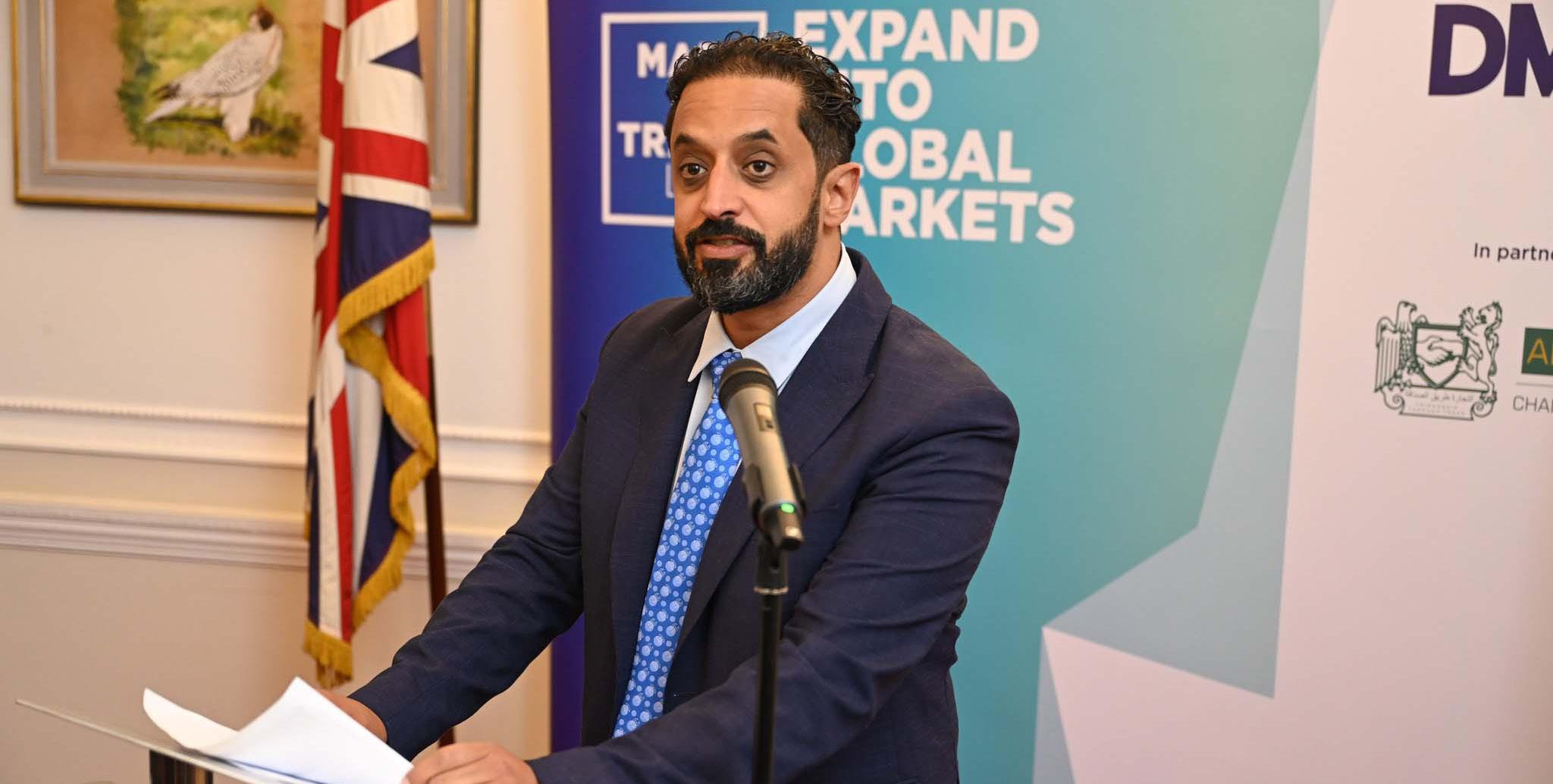
Mr Bin Sulayem was well placed to explain the attractions of DMCC having played a key role in driving its growth from a start-up of 28 member companies in 2003 to become the world’s leading free zone with a growing membership of over 21,000 companies representing 180 countries from all over the world and employing over 65,000 people.
He has overseen an exponential growth of the DMCC Free Zone master development in Jumeirah Lakes Towers (JLT), a 200-hectare business and residential community where over 100,000 people live and work in 87 towers. Mr Bin Sulayem is also overseeing DMCC’s latest real estate project, the Uptown Dubai district.
During the seminar, Mr Mansoor Almansoori, Head of Economic Affairs, at the UAE Embassy, delivered a briefing on business cooperation between the UK and the UAE looking forward to the completion of the UK-GCC Free Trade Agreement and
the stimulus that this would give to bilateral trade and investment flows.
Lord Udny-Lister, the UK Co-Chair of the UAE-UK Businwess Council, introduced the activities of the business council in strengthening business links and promoting innovation in trade and investment.
Ms Khozama Al Saadi, Senior Manager in Corporate Sales, Free Zone at DMCC, delivered a detailing breakdown of the various incentives and attractions available in the DMCC for investors and business operations. She described how DMCC can help businesses to achieve success in the market and its role in fostering strategic partnerships. The offer presented by DMCC attracted considerable interest from delegates.
The formal presentations concluded with a reception and networking.
For more on DMCC https://dmcc.ae/
WEDNESDAY, MARCH 6, 2024 (3:00 PM - 6:30 PM) (GMT+0) //
LONDON

With this event, the ABCC launches an entirely new strand to our popular programme of events designed to meet the needs and expectations of our Platinum members. At this seminar, Platinum members will be given the floor to deliver presentations on their companies and latest business plans before a high end audience of executives, decision makers and diplomats.
There will be opportunities for each of the participants to display and distribute their company promotional material, interact with delegates, share ideas and hold one-to-one meetings in our venue space.
The series of member presentations and Q&A will be followed by a networking reception.
Join us for what promises to be an exciting event.
WEDNESDAY, MAY 22, 2024 (3:00 PM - 6:30 PM) (GMT+0) //
LONDON
The Arab-British Chamber of Commerce is organising the Second Members’ Networking event of the year 2024, to be held at our premises, 43 Upper Grosvenor Street, London, W1K 2NJ.
As usual, several ABCC Members
from various sectors will deliver brief presentations about their businesses to our audience including other ABCC members, colleagues and friends from the Arab-British business and diplomatic community.
We will also be joined by diplomats
including commercial attaches from several Arab Embassies. The event will conclude with a networking reception.
Join us for what promises to be a unique business networking experience

WEDNESDAY, APRIL 17, 2024 (10:30 - 13:00)

LONDON
The Arab British Chamber of Commerce, in association with the Kuwait Embassy in the United Kingdom, invite you to join our Ambassadorial Roundtable for Kuwait.
During the roundtable you will be able to put your questions and there will be opportunities for one-to-one networking.
We hope that you can join us for this exclusive event and look forward to
welcoming you on the day.
The limited places available will be allocated on a first come, first served basis, and priority will be to the ABCC members.

THURSDAY, MAY 9, 2024 (10:30 - 13:00) (GMT+1) //
LONDON
The Arab British Chamber of Commerce, in association with the Mauritanian Embassy in the United Kingdom, invite you to join our Ambassadorial Roundtable for Mauritania.
During the roundtable you will be able to put your questions to His Excellency and there will be opportunities for one-to-one networking.
We hope that you can join us for this exclusive event and look forward to welcoming you on the day.
The limited places available will be allocated on a first come, first served basis, and priority will be to the ABCC members.



WEDNESDAY, APRIL 24, 2024 (15.00 - 18:00) (GMT+1) // LONDON
LONDON
ABES2024
In the run up to the 4th Arab British Economic Summit 2024, the ABCC will be holding a series of Forums on dedicated topics that will feature in the full summit programme. During
this first event, we will be holding a session with a panel of experts from public and private industry to address questions related to social media and e-commerce.
WEDNESDAY, JUNE 12, 2024 (15.00 - 13:00) (GMT+1) // LONDON
LONDON
In the run up to the 4th Arab British Economic Summit 2024 , the ABCC will be holding a series of Forums on dedicated topics that will feature in the full summit programme. During

this event, we will be holding a session with a panel of experts from public and private industry to address questions related to social media and e-commerce.
Join us for what promises to be a unique business networking experience.



Kuwait has developed a five-year major project plan designed to support economic diversification and expand the country’s sources of income. The plan will cover the years 2024-2028.
The blueprint, which comprises feasible and high-return projects, is to be presented to the Kuwait Parliament for formal endorsement, Arabic language daily Alqabas has said.
Government sources were quoted as saying that the projects would include Kuwait’s largest economic zone in North Kuwait and the creation of companies to be specialised in the construction of new residential cities and other housing projects.
The plan is also said to include abolishing the Electricity and Water Ministry and creating joint-stock companies to manage this sector, according to the report.
Proposed projects are also said to include comprehensive plans for the development of roads and other infrastructure and building a rail link between Kuwait City and Saudi capital Riyadh, pointing to the developing
of closer links between the two Arab countries.
The country’s Vision 2035 is seeking to transform Kuwait into a commercial and trading hub that attracts more foreign investments, raising productivity levels, improved human development and encouraging a business friendly environment. There is some overlap between these aims and the Vision 2030 that is currently being implemented by Saudi Arabia.
In recent days Kuwait and Saudi Arabia have held talks at the highest levels with the intention of strengthening bilateral relations in particular aiming to develop closer trade links and investment flows.
As the Saudi Press Agency reported, H R H Crown Prince and Prime Minister Mohammed Bin Salman and Emir Sheikh Mishal Al-Ahmad Al-Jaber Al-Sabah of Kuwait held official talks towards the end
of January on opportunities to develop their bilateral relations with an agenda that covered all fields.
Their talks come at a time when the trade exchange volume between the two countries reached approximately SR11 billion in 2022 and more than SR 6 billion by July 2023, according to published figures.
The two sides stressed the importance of expanding cooperation and pledged to explore and develop economic opportunities in the context of Saudi Vision 2030 and Kuwait Vision 2035.
They agreed on facilitating Saudi investments into Kuwait in targeted sectors including industry, communications, logistics, financial technology, infrastructure and real estate development.

Saudi Arabia invited Kuwaiti investors and companies to expand their businesses in the KSA and take advantage of the available investment opportunities.
Issues such as double taxation and cybersecurity were topics under discussion.
Kuwait and Saudi Arabia also agreed to sign an agreement on a railway project, which will contribute towards a sustainable railway connection between the two countries and enhance trade exchange and economic growth accordingly.
The two leaders further commended their energy cooperation and the successful efforts of the OPEC+ to maintain the stability of global oil markets.
The two countries agreed to enhance cooperation in oil, gas and their derivatives, as well as clean technologies and hydrocarbon resources looking towards developing projects that ensure sustainability of global energy supplies.
The leaders expressed their desire to maximize local content in energy projects through incentivizing innovation, applying
emerging technologies, including artificial intelligence, in the energy sector and developing its environment.
They stressed the importance of enhancing cooperation in energy efficiency, rationalizing its consumption, raising awareness of its importance, exchanging experiences in the energy services companies sector, and developing energy efficiency.
They also agreed to cooperate in the fields of electricity, renewable energy, commercial exchange of electrical energy, developing supply chains and their sustainability for the energy sectors.
The comprehensive discussion covered protecting the marine environment and enhancing bilateral trade exchange, especially in agricultural produce. Communications, technology, digital economy, innovation, and space are also among the fields of cooperation.
Tourism and sports also were matters discussed to meet sustainable development goals, along with strengthening partnerships in sports
programmes and sporting activities.
Cooperation in higher education and scientific research, encouraging direct scientific and educational relations between universities and scientific research institutions in the two countries and activating student and faculty exchange programmes.
The countries will seek to enhance cooperation between health institutions and private sector companies. Regulatory and supervisory cooperation in food, medicine, and medical devices were also topics in focus.
The two countries agreed to cooperate in finance, exchanging expertise and work to enhance the efficiency and transparency of public finance.
They agreed to intensify cooperation to reach industrial integration in priority sectors, and to discuss ways of cooperation between financial institutions in the two countries to provide credit facilities for non-oil goods and products to enhance bilateral trade exchange.
Sources: SPA, Zawya, Kuwait Times (edited)
Morocco is to receive funding from the European Investment Bank (EIB) to support its efforts to advance development of its regions and meet wider climate commitments.
The EIB announced recently that it will provide €115 million (approximately MAD 1.3 billion) to MEDZ, a wholly owned regional development subsidiary of CDG Group, to expand and modernise ten technology parks strategically located in five of Morocco’s regions. This financing reaffirms the EIB’s cooperation with CDG Group and Morocco.
The operation supports the country’s advanced regionalisation policy and its new development model and falls in line with the European Union Agenda for the Mediterranean on resilience and the climate transition.
The project is expected to create up to 51,500 direct permanent jobs in he country, helping to reduce regional disparities while boosting innovation and national competitiveness.
At a EIB Group Forum on 7 and 8 February held in Luxembourg, the EIB and Caisse de Dépôt et de Gestion (CDG) du Maroc reaffirmed their mutual commitment to sustainable development and climate finance, and announced the signature of the €115 million finance

contract for the Technopoles Maroc II project with MEDZ on 29 December 2023. This operation aims to promote regional economic development and help establish Morocco as a competitive carbon-free industrial hub.
Provided via EIB Global, the EIB loan will be used to sustainably expand ten technology parks across several regions, bringing them into line with international environmental standards. The selected parks will house integrated business clusters and industrial platforms with substantial research, development and innovation potential, together with sustainabilityoriented educational components.
This ambitious project supports the goals of the Moroccan government, particularly under
its new development model and industrial acceleration plan, which aim to make the country a role model for carbonfree, responsible and sustainable production methods. It also aims
to back a sustainable economy and reduce regional disparities.
The project builds on the success of 2012’s Technopoles I operation, which has generated approximately 36,000 jobs, and is a testament to the strength of the CDG-EIB partnership.
The project meets EU goals under the new Agenda for the Mediterranean, including resilience, prosperity, the green transition, human development, migration and mobility. It will also contribute to the Morocco-EU Green Partnership set up in October 2022.
“We are proud to strengthen our partnership with CDG Group. This financing is a major step forward for our productive working relationship,

and shows our joint commitment to sustainable development, economic prosperity and the decarbonisation of Moroccan industry,” said EIB VicePresident Nicola Beer.
“This ambitious project will not only provide an innovation boost to the Moroccan economy but will also create sustainable jobs and reduce regional disparities, while building greener and more competitive industry.”
For his part, Caisse de Dépôt et de Gestion (CDG) General Director Khalid Safir, stated: “We welcome the strengthening of our partnership with the EIB, which we have been consolidating for several years now. The share the same objectives on the economic and social influence of our Moroccan regions and the reduction of regional disparities. As a high-impact player, we aim to step up our action as a sustainability driver of our economy. This is why we will continue to combine our investment and financing efforts with major institutions like the EIB with which we share these values.”
CDG
Created in 1959, Caisse de dépôt et de gestion du Maroc (CDG) is a public financial institution managing long-term savings in Morocco. It supports the transformation of the national economy and regional modernisation. It actively backs major
projects in regionalisation, the energy and technological transition, and the development of strategic sectors promoting growth and social progress. Its public status and the nature of the private funds it manages enable it to combine this dual remit by securing the savings it holds and supporting the economic development of the country.
A subsidiary of CDG Group, Morocco’s largest institutional investor, MEDZ is a leading player in the development and management of industrial business parks. Since its creation in 2002, it has used its expertise and know-how to support the economic, social and regional development of the country by offering high-quality services to investors, enabling them to maximise their competitiveness. It offers them infrastructure meeting international standards and sustainable development requirements in prime locations in Morocco.
The EIB has been a key partner for Morocco for more than 40 years where it finances the development and implementation of important projects in vital sectors of the economy such as business support, agriculture, water and sanitation, education, health, transport and renewable energy.
EIB Global is the EIB Group’s specialised arm devoted to increasing the impact of international partnerships and development finance. It is designed to foster strong, focused partnership within Team Europe, alongside fellow development finance institutions and civil society.
Source: EIB (edited)


The UAE Ministry of Economy has announced the launch of its new intellectual property (IP) system including 11 integrated initiatives in various fields and applications of intellectual property, with the aim of enhancing the innovation and creativity landscape in the emirates.
The announcement sees the UAE making a leap towards becoming a global hub for innovation and creativity.
One of the new initiatives, named the Innovation Hub, offers an online incubator platform for UAE creators to provide technical guidance and assistance with patent registration
process. The initiative will be carried out in collaboration with the Emirates Association for Talented.
Another aspect of the IP strategy, the Patent Hive, aims to increase the number of patents granted and promote the participation of innovators and talents in filing patent applications in the UAE.
This has the goal of achieving 6,000 new patent registrations by 2026, in collaboration with relevant research and academic institutions.
Furthermore, the Ministry, in partnership with the Emirati Talent Competitiveness Council (Nafis), has undertaken the Emirati ‘Fahes’ (examiner) initiative to


enhance the skills and competitiveness of Emirati talents in the field of intellectual property.
The InnovLAB initiative is a partnership with the UAE Minister of State for Government Development and the Future and focuses on strengthening the capacities of innovation incubators, supporting their competitiveness, and assessing the effectiveness of incubators in local federal and educational establishments.
The fifth initiative, InstaBlock, is an immediate service offered by the
Ministry in collaboration with the Telecommunications and Digital Government Regulatory Authority that is dedicated to addressing complaints concerning livestream copyright infringements.
An IP SPORT initiative is also set to launch with the aim of increasing the number of registered trademarks in the UAE’s sports sector. This is a collaboration between the Ministry and the General Authority of Sports (GAS).
One other initiative is the One Day TM initiative, which is a collaborative effort between the Ministry of Economy and the Ministry of Finance. It offers a service aimed at expediting the issuance of a trademark registration certificate.
The Ministry will also implement the IP Platform initiative in collaboration with relevant government entities. This is a consolidated digital platform to be developed during the upcoming phase to connect and integrate data from various government departments responsible for enforcing intellectual property rights.
Further, the Ministry shared plans to introduce the ‘Hayyakom’ initiative in connection with the UAE’s hosting of the INTA Meeting to boost the UAE’s appeal to global companies and enhance its brand image.
The IP School initiative will develop a comprehensive portfolio of training programs for intellectual property endorsed by the World Intellectual Property Organisation (WIPO). This also involves designing suitable training for students in collaboration with WIPO, the Brand Owners Protection Group, and the Dhahi Khalfan Intellectual Property Centre.
Finally, there is the virtual character ‘Aisha’, whose main purpose is to raise awareness of intellectual property rights, engage with the public, and address their queries.
The launch was organised by the Ministry in the presence of H.E. Abdulla bin Touq Al Marri, Minister of Economy, and H.E. Abdullah Ahmed Al Saleh, Undersecretary of the Ministry, as well as representatives of several federal and local government entities and academic and research institutions in the country.
The Minister of Economy declared: “The UAE has made great strides in developing its intellectual property sector in accordance with global best practices, recognizing it as a fundamental and key pillar for promoting economic growth. The launch of the new IP system is a milestone in our efforts to enhance the country’s transition into a knowledge and innovation economy and develop an incubating national environment for intellectual property, innovation and patent activities. This is in accordance with global best practices and in line with the objectives of the “We the UAE 2031″ vision to establish the UAE as a global hub for the new economy and strengthen its position among the top 15 countries in the Global Innovation Index.”
The Minister explained that the new system is based on four main themes:
• Promoting the comprehensive protection offered to intellectual property rights,
• Reducing violations faced by patentees and innovators,
• Resolving disputes, and
• Developing the services provided by the Ministry to individuals and institutions wishing to register patents.
“It will be based on AI technology, allowing enablers and facilities to support the growth of R&D-based projects, exploit the fruits of intellectual property protection and market them as national exports to foreign markets,” the Minister continued.
“The new system will play a prominent role in increasing the revenues of the national IP sector by facilitating the export of advanced national products and services based on innovation and modern technology to foreign markets. It will also stimulate the attraction of intellectual property investments by supporting trademark registration and patents, as well as work on technology transfer from advanced to emerging sectors by providing licenses for the use of technology and knowledge.”
For further information on IP and other issues see the UAE Government Portal: https://u.ae/en/information-andservices/business/intellectual-property
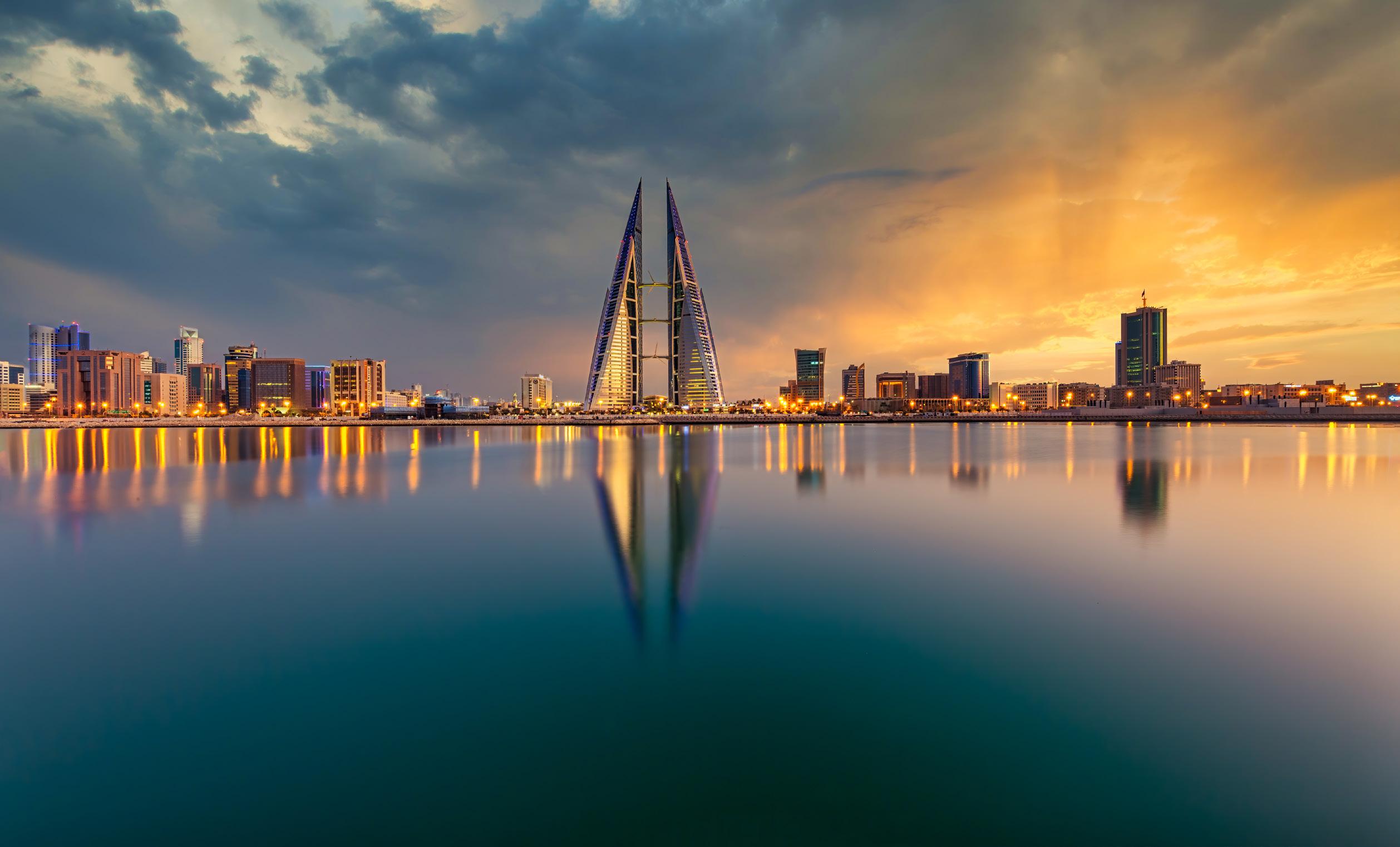
Bahrain secured a ranking of first globally in Islamic Finance Regulations in this year’s edition of the ICD-LSEG Islamic Finance Development Report, cementing the country’s standing as a leading pioneer in Islamic financial regulation on an international level.
Assessing the global industry’s performance during 2022, the report demonstrated the transformation of the Islamic finance industry across the past decade, which began as a niche market and gained a competitive edge, spreading across several countries and regions.
With noticeable growth across the Middle East, the report determined a surge in the practice of sustainable finance at Islamic banks, which has led to the development of new frameworks covering ESG and sustainable investments.
Based on the Islamic Finance Development Indicator (IFDI), the report was jointly launched by the Islamic Corporation for the Development of the Private Sector (ICD), the private sector development arm of the Islamic Development Bank Group (IsDB) Group, and the London Stock Exchange Group (LSEG), the world’s leading provider of financial markets data and infrastructure.
The findings were driven by the analysis of statistics from 136 countries around the world, compared across five indicators, namely financial performance, governance, knowledge, sustainability, and awareness.
The report outlines fintech, digital banking, and artificial intelligence (AI) as some of the key emerging trends, which resulted in pivotal impacts on the
development of Islamic banking in the decade leading up to 2022.
As well as being recognised as a country where new digital banks were opening among leading countries across Asia, the Middle East, and Europe, Bahrain earned high rankings across key criteria. Bahrain was recognised for an upsurge in hosting online events led by the Accounting and Auditing Organisation for Islamic Financial Institutions (AAOIFI), the General Council for Islamic Banks and Financial Institutions (CIBAFI) and the International Islamic Financial Market (IIFM), all of which are headquartered in Bahrain.
Mr Khawla Ahmed Hasan Ibrahim, Director of Islamic Financial Institution Supervision at the Central Bank of Bahrain, said, “The CBB is committed to fostering a robust, transparent, and dynamic Islamic financial sector by putting in place a regulatory framework aligned with international best practices while supporting innovation and growth in Islamic finance. The CBB will continue to provide a supportive ecosystem for investors and institutions alike to thrive within the Kingdom’s financial services sector, particularly in areas like fintech, crypto assets, governance and sukuk.”
Commenting on the news, Mr Dalal Buhejji, Executive Director of Business Development for Financial Services at Bahrain Economic Development
Board (Bahrain EDB), said “This record achievement is a testament to the calibre of the financial ecosystem in Bahrain, particularly when it comes to Islamic banking. Bolstered by its solid foothold in financial services, the largest contributor to nominal GDP, Bahrain is uniquely positioned to cater to the needs of Islamic finance institutions as well as fintechs and startup institutions offering sharia compliant products and services.”
Since its inception, Bahrain’s advanced financial services sector has continued to innovate by nurturing an environment conducive to the ongoing development of Islamic finance, on both a human talent and industry level.
In the Islamic Finance Development Report, Bahrain achieved an overall ranking of 4th globally and 2nd in the Middle East & North Africa (MENA). Bahrain was additionally ranked 1st in the Gulf for Islamic Banking and 3rd globally for Islamic Finance Governance, indicating its excellence in regulation, corporate governance, and Shariah governance.
Bahrain EDB acts as a first port of call for any business seeking to set up in Bahrain, and has a dedicated team with the expertise, knowledge and resources to get companies off the ground.
Source: Bahrain EDB
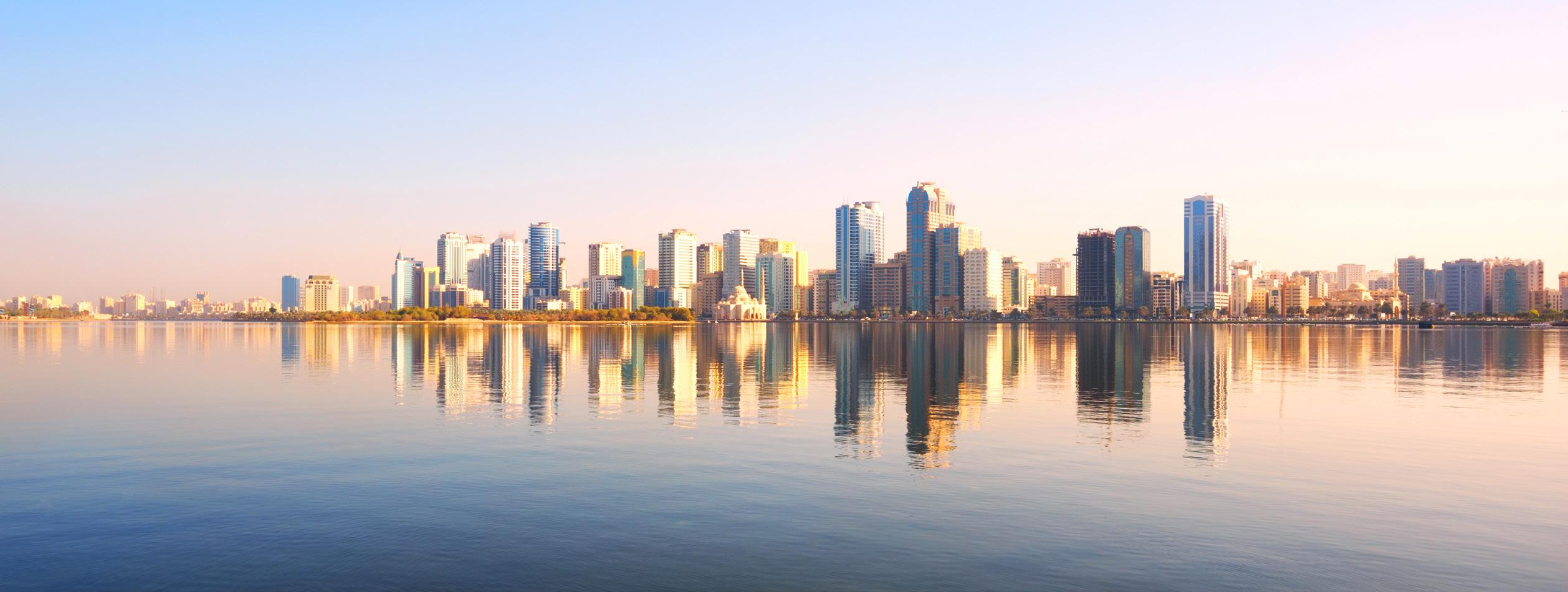
The Sharjah Chamber of Commerce and Industry (SCCI) has announced a series of significant achievements made over the course of the past year, underscoring its multifaceted endeavours in bolstering the business community.
In 2023, the Chamber saw a notable increase in its total registered members, reaching 72,187, with 7,160 new members joining— that is a growth rate of 10 percent from the 65,000 members recorded in 2022.
According to the SCCI’s data, the number of membership renewals in 2023 hit 55,087 across industrial, commercial, and professional sectors. Additionally, free zone memberships stood at 1,795, while exports and re-exports were valued at approximately AED 33 billion.
These achievements reaffirm SCCI’s commitment to fostering sustainable economic development within Sharjah, enhancing growth in various economic sectors, improving the sustainable performance of the private sector, and attracting direct investments.
Mr Abdullah Sultan Al Owais, SCCI Chairman, emphasised that these notable accomplishments made over the past year clearly reflect the chamber’s success in meeting the strategic goals of its 2022–2024 strategy. These goals include not only supporting the business sector and fostering sustainable economic practices, but also stimulating the growth and diversification of Sharjah’s exports and investment inflows and enhancing the economic development trajectory of the emirate.
“Looking ahead, we will continue to focus on promoting Sharjah’s economic competitiveness, through launching a series of projects and initiatives that promise to inject new vitality into the business community, bolstering the private sector’s performance and its competitive standing on a global scale,” Mr Al Owais added.
Meanwhile, Mr Mohammad Ahmed Amin Al Awadi, Director-General of the SCCI, commented, “The Sharjah Chamber, along with its affiliated entities, has made significant strides, propelling the external expansion of our members. We’ve deepened economic partnerships with key markets regionally and globally through proactive collaboration with specialised bodies, diplomatic missions, and official delegations.
“In 2023, we’ve held over 100 business meetings organised and participated in more than 10 investment seminars and forums, coupled with the signing and enactment of nine agreements and memoranda of understanding with various countries and international chambers of commerce. These achievements have played a pivotal role in bolstering Sharjah’s economic presence internationally and facilitating our members’ access to new markets,” Mr Al Awadi noted.
Mr Al Awadi highlighted that in 2023, the Chamber dispatched several trade missions abroad, aiming to widen its global trade partner network, foster closer ties with countries worldwide, spur business growth, and attract investment to the emirate by leading trade missions to nations such as India, Uganda, and Kenya.
The SCCI also engaged in organising, coordinating, and participating in events that support sectoral business groups on a regional and international level, in the quest to seek new business investment opportunities.
Moreover, the Sharjah Exports Development Centre, which is associated with the SCCI, represented the Emirate and its members at a wide range of international events and trade exhibitions over the course of 2023.
The marketing campaigns launched by the SCCI last year stood out for their remarkable success, profoundly influencing several economic sectors, notably retail and tourism. Among these, were the “Sharjah Summer Promotion 2023” “and the Sharjah Ramadan Festival. Additionally, “Sharjah Shopping Promotions” attracted thousands of shoppers from across the emirates and tourists to Sharjah’s prime tourist spots and markets. This was particularly evident in the Eastern Region, home to the successful “Kalba Winter” initiative, which further boosted the emirate’s appeal as a shopping and tourism destination.
Also in 2023, the Sharjah Excellence Award, organised annually by the SCCI as part of its commitment to fostering
a culture of quality and institutional excellence as well as adopting best practices within the UAE and Gulf private sectors, underwent significant transformations. The award witnessed not only substantial participation from the UAE and Gulf business communities but also notable developments in various award categories.
These changes aimed to boost the level of positive competition among the economic entities participating in the award, reflecting a qualitative leap in the pursuit of excellence and innovation in the region’s business landscape.
The Sharjah Training & Development Centre, operating under the umbrella of the SCCI, achieved success in its mission to improve workforce skills and knowledge. The centre conducted 66 training programmes, benefiting 588 individuals from both the public and private sectors. Additionally, it focused on the future generation and jobseekers by training and qualifying students from various universities, colleges, and schools and jobseekers.
Furthermore, 25 specialised internal training programmes were arranged for staff members, training 131 male and female employees for a total of 3,377 hours dedicated to enhancing the skills of the SCCI’s workforce.
Additionally, 16 field visits were conducted to observe the best practices of the Centre, and 105 Human Resources Department employees received training.
Moreover, educational and awareness workshops and seminars were organised for both the SCCI’s employees and individuals from the public and private sectors.
The centre also signed five new cooperation agreements and memoranda of understanding, along with the implementation of two HACCP consultations in the food sector to help the private sector.
Source: Emirates News Agency (edited)
The Kingdom of Saudi Arabia is outpacing its own vision targets, latest reports indicate, with statements of key ministers providing the evidence.
The country’s economic growth is on track to exceed targets set by its 2030 Vision strategy, according to latest public pronouncements. And in the Kingdom’s tourism sector, having already exceeded its target of 100 million visitors last year, it is now looking to achieve 150 million tourist visitors by 2030.
The Saudi private sector is currently booming and is set to drive the economy beyond the Vision target of $1.7 trillion (SR6.4 trillion), according to the Kingdom’s investment minister.
Speaking in the capital Riyadh during a panel discussion at the second Public Investment Fund’s Private Sector Forum, Minister of Investment, H E Khalid Al-Falih, noted that 65 percent of the Kingdom’s gross domestic product will come from nongovernment-backed sources by the end of the decade – which will be up to four times more than the contribution made before the 2030 economic diversification strategy was announced in 2016.
The minister told the forum, held in the first week of February, that the private sector was the main focus of Vision 2030 as Saudi Arabia seeks to steer away from a dependence on oil revenues.
Mr Al-Falih estimated that the economy will grow from SR2.6 trillion, adding: “So 65 percent of SR6.4 trillion is about three to four times the contribution of the private sector before the vision in terms of quantity, size and type.”
The Private Sector Forum was held at the King Abdulaziz International Convention Centre and designed to foster partnerships between sovereign wealth fund, PIF, its portfolio companies
and the private sector, in an effort to increase local content to 60 percent by the end of 2025.
The minister stated that the volume of investments targeted during Vision 2030 amounted to SR12.4 trillion, with the amount in the contracting sector alone totalling SR1.8 trillion.
He urged the private sector to prepare, raise its capabilities, and enter into global partnerships, remarking that incentive packages had been introduced across several sectors.
“We have special economic zones that will be the largest in the region and will reach the level of global competition. We will compete with Shenzhen and the economic zones on the Red Sea and the Arabian Gulf, including Ras Al-Khair region, which embraces the shipbuilding and metallurgical industries,” the minister went on.
Another sign of the Kingdom outpacing its Vision targets can be seen in the remarkable growth of its tourism sector, where it had already exceeded the 2030 target of attracting 100 million visitors annually.
This achievement was confirmed by Minister of Tourism H E Ahmed bin Aqeel Al-Khateeb who stated that the Kingdom had reached the goal of hosting 100 million tourists in 2023.
Giving further details, the Minister stated that 77 million were domestic tourists and 27 million were international tourists who collectively spent SAR100 billion.
The Minister was speaking in a panel discussion on “The Importance of the Private Sector in Achieving Vision 2030”, at the aforementioned Private Sector Forum.
Minister Al-Khateeb stated that a new tourism target for 2030 had now been adopted by the Kingdom which aimed to attract 150 million tourists, of which some 80 million would be domestic and 70 million from abroad.
In order to achieve this, the minister said the Kingdom has committed to funding professional training programmes directed as tourism sector staff, adding that more than 100,000 young Saudi men and women had received professional training last year with 15,000 trained to join the tourism sector.
Mr Al-Khateeb drew attention to ongoing efforts to improve legislation and encourage investment, highlighting the establishment of the Tourism Development Fund, which has funded over 50 projects totalling SAR35 billion.
The growth in Saudi tourism has been commended by industry experts who cited recent World Tourism Organisation reports that confirmed the significant contribution of the Kingdom’s tourism sector to enhancing global tourism growth, stressing how Saudi Arabia led the G20 countries in the growth in the number of arriving tourists in 2023.
The Kingdom is now also ranked second among the fastest growing destinations in the world during the first three quarters of 2023.
Sources: Arab News, Asharq Al Awsat (edited)



Some major new projects have been announced by Iraq since the start of the new year and are open for investment.
Details of the Baghdad Metro project and the Najaf-Karbala Metro (Phase I) were unveiled announced on 12th February by the country’s National Investment Commission (NIC).
Formally issuing the announcement, Dr Haider Mohammed Makiya, President of the NIC), said the selection of international executing companies would be pursued, “through the Iraqi government’s international consultant, who has been contracted for the two projects. Their task will include auditing and selecting the best proposals.”
The top official added that the NIC would be able to provide guarantees to protect the rights of international investors, ensuring an attractive investment environment for vital projects in the country.
Details of tender for the construction of metro transport system in Baghdad
Baghdad Metro is a group of rail routes using advanced trains that operate automatically and operate without a driver. The metro routes pass
through stations above, below and on the ground with two tracks back and forth, according to details contained in the official published tender documents.
“The Baghdad Metro Project includes seven (7) main lines (routes) with a total length of (150) km, one-hundred fifty kilometre, (64) sixty-four metro stations, four (4) workshops and depots for trains, (2) two metro train control and management centres and power generation stations.
“The train carriages consist of a gold class cabin, a special cabin for women and children, and tourist cabins. The carriage design also contains seats that meet the needs of the elderly and people with special needs.”
This project is being offered on a design, build, operate, maintain, finance, and transfer ownership (DBOMFT) model, and the deadline for receiving Investment bids is Thursday, 11th April 2024.
The metro will link the holy cities of Najaf and Karbala, meeting a need for
an advanced mass means of public transport to serve pilgrims visiting the cities and to provide a safe, large-scale and fast means of transportation.
The project is to be a model means of transportation compatible with sustainable environment aims and a clean transport system using electric energy.
According to published plans, the route to be taken will start from Najaf International Airport, passing through the city centre of holy Najaf province, arriving at Karbala Airport International and then on to the city centre of holy Karbala province, with a total of four main railway stations. The proposed length of the route is 90 km.
As with the Baghdad project, this one is offered on a design, build, operate, maintain, finance, and transfer ownership (DBOMFT) model, and the deadline for receiving investment bids is Thursday, 11th April 2024.
The projects are open to international companies and foreign investors through the NIC’s official website.
https://investpromo.gov.iq/

With the growth in technology, vertical farming offers the potential to provide fresh food to meet local demand and enables the Arab region to become much less dependent on precarious essential food imports.
Masdar City, Abu Dhabi’s sustainability and innovation hub, has just launched its indoor vertical farm with agricultural technology firm Alesca Technologies, to address local food security challenges.
The new project uses automated equipment and AI software to grow several varieties of fresh leafy greens, lettuce and herbs that are free of harmful chemicals and ready to eat.
The Masdar project is the latest vertical farm initiative that offers an increasingly popular option in the region to produce an efficient, reliable source of fresh food produce. The farm will be housed in two repurposed shipping containers near Masdar City’s Eco-Plaza, the first of which is already up and running, with plans to expand the second in the coming year.
Once fully operational, the containers will generate upwards of 650 kilograms of leafy greens per month around the clock without interruption.
Vertical farming is a method of cultivation increasingly used around the world enabled by the growth in technology. Arab countries see the benefits of vertical farming to feed their growing populations and to be less dependent on imported food produce.
The process involves growing plants indoors and is also known as indoor farming. Instead of sunlight and rain, vertical farms use LED lighting and controlled growing and nutrition systems. Plants are stacked vertically in layers, so many of the farms resemble warehouses filled with large shelving units. Only a few years ago, this sounded futuristic, but it is fast becoming a widely used and known tried and tested method of essential food production.
When it was launched in 2022, ECO1, a vertical farm in a large warehouse facility near Dubai airport, was described as “the world’s largest vertical farm”. ECO1 supplies passengers and Dubai consumers with fresh produce and marked a collaboration between Crop One Holdings company and Emirates Flight Catering.
The 30,000-square-metre farm can produce more than 900 tonnes of various leafy greens like spinach and lettuce annually on stacks of shelves in a process that uses 95% less water than crops grown in fields.
Vertical farming is increasingly considered to be a highly efficient and sustainable way of producing food.
Automation is the key to efficiency with software, robotics and data science key technologies used in vertical farms process to monitor crops and create the best available growing conditions. The process includes precision controlling of temperature, humidity, CO2 and lighting.
This highly controlled environment for agriculture helps to reduce the vertical farm’s environmental impact, eliminating the need for use of many damaging pesticides.
Vertical farming means that cultivation is no longer reliant on the unpredictable weather conditions, enabling fresh produce to be grown all the year round without interruption.
In addition, instead of growing fruit and vegetables on big farms and then transporting the produce over long distances in trucks and planes, vertical farming can supply local produce made in neighbouring locations. This means less fuel is used and the food consumed will be fresher.
Vertical farming is increasingly becoming the future of farming across the region and looks like playing a much more important part in feeding the local population.
Sources various.
Arab countries are seeking to develop more free zones as a means of attracting investment and providing economic stimulus. In 2024 already there have been several public announcements on the development of free zones in various countries.


In Algeria, it has been announced that plans have been approved to build “5 free trade zones” which will be dedicated to expanding investment and commercial exchanges within West Africa, local newspapers have reported recently.
Algeria’s Alwast and other dailies quoted the country’s Trade and Export Promotion Minister Tayeb Zitouni as saying during a recent visit to the project site for one zone in the Western Tindouf Province, that, “This zone is one of 5 free trade zones which will be set up in West and South Algeria…their main purpose is to develop exchanges with West Africa.”
The minister said Tindouf zone was expected to cost around 3.6 billion Algerian dinars ($27 million).

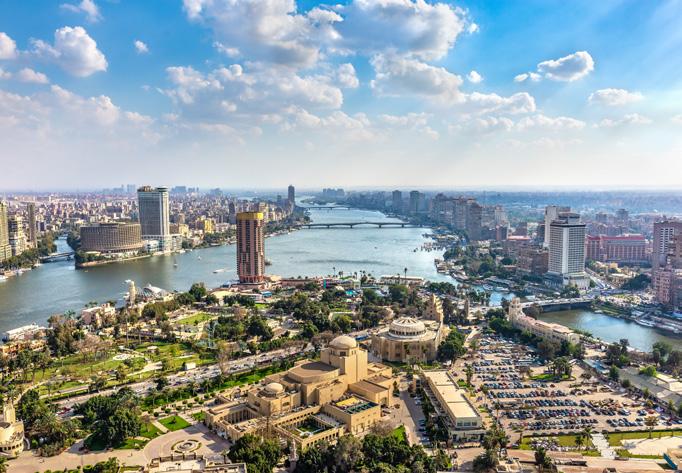
Meanwhile, in Egypt it has been reported that the country’s Prime Minister Mostafa Madbouly has met with officials to review 11 sites proposed for the establishment of new industrial free zones, according to a cabinet statement.
The move comes part of plan to promote new investments, especially in the industrial sector, the PM said, who stressed the importance of specific international standards in setting up the new zones, which will attract FDI.
Egypt seeks to attract investment that is sufficiently large in size to boost local industry and exports. Building local industry is a key goal of the zones.

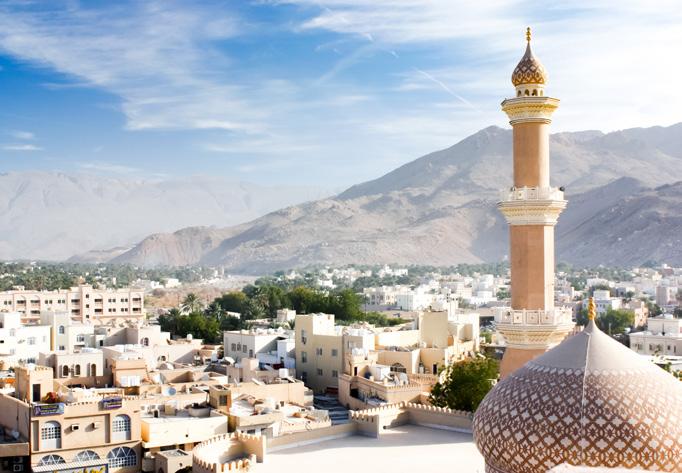
Turning to Oman, its Salalah Free Zone has just marked the inauguration of three new export-oriented projects in the foods, petrochemicals, and mining industries.
Salalah Free Zone, operated by Asyad Group, gave details of the high-value projects which include a RO9.6mn food processing plant run by Special Integrated Food Company (SIFCO) and the first phase of Al Namariq Mining Company’s quicklime plant.
Dr Ali Mohammed Tabouk, Salalah Free Zone CEO, commented on these latest investments, “These new project additions reflect the critical role of Salalah Free Zone in driving industrial progress and stimulating economic growth in Oman. We are proud of the strategic transnational partnerships unveiled today with market players from Yemen, Iraq, and Pakistan, which will bolster the manufacturing and value-added capabilities in the sultanate.”
The new plants are equipped with the latest production technology and hardware, optimising production capacities and product quality while capitalising on the unique competitive advantages offered by Salalah Free Zone.
“Such new ventures enable sustainable development in Oman by enhancing the country’s industrial infrastructure, increasing exports, and boosting trade. We look forward to supporting our partners’ growth and contribution to Oman’s economy,” the CEO stated.
Salalah Free Zone, Oman’s regional business hub for industrial and logistics activities, has also reported impressive investment growth for 2023, securing new investments worth RO728mn during the year.
During 2023, the zone signed nine new investment agreements, allocated 1.2mn square meters of leased land, and issued eight construction permits. These accomplishments have led to a substantial surge in cumulative investments, now exceeding RO4.5bn, with a land occupancy rate surpassing 50%, including 129 investments and a leased land area of 6mn square meters.
With its integrated logistics solutions and land offerings, Salalah Free Zone is becoming a major hub for regional and global businesses to expand into Oman, create distribution centres, and capitalise on fast, seamless access to some of the largest consumer markets worldwide.
As a premier hub for high-quality industrial and logistical activities, Salalah Free Zone offers various economic incentives, advantages, and facilities to investors, including tax exemptions and the right to full foreign ownership of investment projects. Its strategic location next to the Port of Salalah, overlooking major global shipping routes, positions it among the world’s top-tier commercial ports.
Sources: Muscat Daily, Zawya and others (edited).


The Kingdom of Saudi Arabia’s Minister of Municipal and Rural Affairs and Housing, H E Majed Al-Hogail, has said that his country’s goal is to transform at least 10 of its cities to make them rank among the top 50 global cities.
“This will be achieved through governance, sustainability, and interaction with the population to meet their aspirations and to realize a high rate of well-being for the citizens, the Minister said at a major firm in the, “ capital Riyadh.
The remarks came while inaugurating the first edition of the Global Smart City Forum 2024 which opened on 12 February. The two-day event was organised by the Saudi Data and Artificial Intelligence Authority (SDAIA), in cooperation with the Ministry of Interior and the Ministry of Municipal and Rural Affairs and Housing.
Around 80 speakers, including global city experts, specialists in data, artificial intelligence and digital solutions, smart city engineers, investors and economic policy makers from 40 countries worldwide participated in the conference held under the theme “A Better Life”.
Mr Al-Hogail said that Saudi Arabia was working to find solutions to many challenges facing the growth and prosperity of cities and the entire nation. He cited several examples of the action that the Kingdom has been taking.
“A waste management solution was presented in the city of Jeddah on the Red Sea coast of western Saudi Arabia, to plan and monitor operations, relying on emerging technologies such as the Internet of Things,” he said while noting
that this resulted in reducing violations related to waste and cleanliness by 25 percent, leading to a cleaner city.
The Minister stated that in the city of Dammam on the coast of the Arabian Gulf, “we presented an application that manages more than 20,000 parking lots, and through it, we have access to the city’s most crowded areas so as to achieve a seamless experience for residents to find available parking.”
Mr Al-Hogail said that the ministry was continuing, with great ambition, to build one of the most prominent national applications and models, namely “Digital Twin,” which transforms the way cities are planned and operated.
“By 2025, we will be able to simulate the impact of urban policy, plan for emergencies and disasters, and connect more agencies and residents to contribute to joint design for cities with us,” he said.
The Minister continued saying that the development of smart cities takes place through four axes: an ambitious vision in Saudi Arabia, a group of licenses achieved, ongoing efforts and plans, in addition to the goal of partnership between entities to enhance urban life.
He stressed that the Kingdom’s ambitious vision is invested all the capabilities of the nation so that this renaissance would reflect positively on the entire region.
“This support and ambition made us search for distinctive experiences and attract exceptional models to move towards our goals as the vision is based on creating environmental and operational systems that enhance the quality of life. It fuels innovation in the city’s services and economy,” the Minister added.
The Global Smart City Forum is just one of the steps that the Kingdom has taken toward making it a leader among economies using data and AI. The forum is expected to support ongoing efforts of governments around the world to adopt innovative models of smart solutions that contribute to improving public services and safety, and enhance environmental sustainability, with human wellbeing right at the centre of the development.
Topics discussed at the forum included the future of smart cities, challenges facing their infrastructure, the search for innovative solutions to confront the growing population numbers of cities around the world, learning about best practices in building smart cities and about the latest technical developments and their applications in the Kingdom, how it can learn from the experiences of other countries, like, for instance, the UK, in line with the Saudi Vision 2030 as well as the UN Sustainable Development Goals.
Sources: Saudi press

Digital transformation is a fundamental pillar in the strategies that Arab countries have launched to move towards the future and achieve sustainable development, underpinned by a thriving economy, a vibrant society, and an ambitious nation. The most notable of the various strategies include among others the “Saudi Vision 2030”, “Egypt Vision 2030”, “ Jordan 2025”, “Oman Vision 2040”, “Morocco 2035” and “Kuwait 2035”.
Each of these visions represent an ambitious and clear roadmap for completing specific projects in various sectors to achieve their country’s comprehensive and sustainable development. The strategies also receive continuous updates in goals and mechanisms and are characterised by flexibility and adaptability.
Digital transformation is defined as the process of integrating and adopting digital technologies in all areas of work, which fundamentally changes how sectors operate in different areas and how they deliver added value.
A report released at the World Governments Summit 2024 in Dubai, revealed that skills are one of the biggest challenges for government employees.
The Arab Vision for the Digital Economy, which was launched in December 2018 in Abu Dhabi, provided a major boost to these trends.
The Arab Digital University has also been launched as an integrated digital platform for education and vocational training. It will serve as an important and new tool for spreading knowledge and science across emerging economies covering the Middle East, North Africa and West Africa. The Arab Digital University believes that education is the cornerstone from which governments
must start as they seek to build a better future for their people.
The Saudi Vision 2030 focuses heavily on the technology and innovation sector, which is one of the most important factors in promoting economic development and achieving progress across various fields. Completing Vision 2030 requires investing in technology and innovation to enhance competitiveness and achieve sustainable economic development.
The National Transformation Programme was at the forefront of Vision 2030, which aims to develop the necessary infrastructure and create an enabling environment for the public, private and non-profit sectors to achieve the aims set out in Vision 2030 by a focus on excellence in government performance and supporting digital transformation.
It was in 2018 that Egypt launched the Digital Egypt initiative and established the ‘Digital Egypt Services’ platform through unified data for more than 100 government databases.
This platform provides 170 fully automated services, and it also launched the Digital Egypt Vision for Cross-Border Services 2022-2026 to push the sector on a higher growth path.
Oman Vision 2040 has placed information and communication technology as one of the enabling and stimulating factors to achieve more economic productivity and effective service sectors. The Government of the Sultanate of Oman has also adopted the National Programme for the Digital Economy, which represents a strategic direction for building a thriving digital economy that effectively contributes to GDP.
The Hashemite Kingdom of Jordan has developed a strategy for digital transformation by 2025, and more than 50% of government services have so far been digitised. Jordan aims to increase the contribution of the digital sector to its GDP to 15% from 9.5% currently.
Kuwait Vision 2035 is primarily based on digital transformation, and the adoption of smart and digital technologies to improve its services, drive the economy and improve the quality of life, in addition to enhancing operational efficiency and supporting the performance of key sectors.
Kuwait launched the “Masar” initiative to accelerate the pace of digital transformation in the government sector. Source: Emirates News Agency (edited)


The e-commerce sector in the Middle East and North Africa is expected to reach $57 billion in 2026, growing at an annual compound growth rate of 11%, according to industry experts.
In particular, Saudi Arabia’s e-commerce revenue is expected to grow annually at 13.5% through to 2027, exceeding the global average of 11%, one industry report has revealed.
The e-commerce growth is a main objective of Saudi Vision 2030 and meets the Kingdom’s development objectives which sees around 80 projects, mainly focusing on logistics development, set to be established.
Global supply chain services company, Agility Logistics reports that $10 billion was generated through Saudi e-commerce in 2023 alone, which made the Kingdom the 28th largest online market globally.
The report claimed that in areas such as investments, logistics capacity, and shipping volumes, Saudi Arabia has established itself as the region’s new e-commerce leader.
“Saudi Arabia has simplified licensing for domestic delivery providers and created multiple tiers of licenses. At the same time, fresh investment has poured in to boost warehousing, fulfilment and trucking capacity,” added Agility.
Recently Dubai launched a new International Growth Initiative to support the growth of SMEs including businesses that operate in the e-commerce sector. A statement announcing the initiative
describe it as “focusing on Dubai’s key strategic sectors”.
The funding programme, which is backed by the Dubai Government and Emirates NBD, will in its first phase facilitate up to Dh15 million in funding to SMEs for periods of up to 7 years.
The ‘Dubai International Growth Initiative’ is aligned with the Dubai Economic Agenda D33 which aims to double the size of the emirate’s GDP.
Meanwhile, Flextock, an e-commerce enabler in the Middle East, has observed that since cross-border trade was introduced into the region, it has experienced significant growth.
The company is preparing to elevate the sector further by offering a cross-border trading services portal, contributing to a projection of the regional e-commerce industry’s gross merchandise value (GMV) reaching $140 billion by 2027. While the company operates across several sectors, fashion and cosmetic merchants will be notable beneficiaries.
A focus for Flextock in recent years has been Saudi Arabia where retail and many other industries are flourishing.
With the MENA region’s overall economy projected to rise by 2.9% in 2024 and 4.2% in 2025, from an estimated 2%
in 2023 , Flextock’s decision to launch a cross-border trading services portal reinforces its commitment towards empowering businesses to reach international markets. It is seeking to fully unlock the region’s e-commerce potential.
The cross-border trading services portal includes all the actions required to make it easier for businesses to expand to and from Saudi Arabia, Egypt and the UAE. Key features include international shipping, customs clearance, tariff and trade compliance, and international payment solutions, among others, to provide a seamless trading experience for merchants.
To date, Flextock has helped merchants scale operations in the region within only three months of launching its new cross-border trading services portal, Trade Arabia reported. These retailers, who operate in a variety of industries including fashion, cosmetics, and home accessories have seen a notable boost in their customer base and financial gains.
The rapid growth in e-commerce in areas such as retail has led to an increased awareness of the need to introduce new measures that ensure consumer protection against potential risks posed by online transactions.
Edited from various news reports

Consumers are at the core of every business, and what they say, think, and feel about the brands in their market is pivotal to business success, YouGov says on the release of its report, Global Best Brand Rankings 2024, which includes leading markets in the MENA.
The report showcases the top brands and biggest improvers among consumers in the UAE, Saudi Arabia and Egypt.
Of company brands in these three markets, Emirates had an Index score of 60.7 and was seen as the top brand in the UAE by YouGov; Saudia took the lead in the Saudi market with a score of 59.4, and WhatsApp was top in Egypt with a score of 48.7.
Other notable brands mentioned by the YouGov report are Sea World Abu Dhabi, STC Telecom in the KSA, and Almarai in Egypt who all emerged as the most improved brands of the year, with noteworthy changes in their Index scores compared to last year.
“Consumers are at the core of every business, and what they say, think, and feel about the brands in their market is pivotal to business success,” says YouGov of it Index.
Data on the brand rankings are as follows: Top
1 Emirates 60.7
2 adidas 58.9
3 Samsung 57.3
4 iPhone 55.0
5 Apple 54.4
6 Almarai 54.2
7 Nike 54.1
8 YouTube 54.1
9 WhatsApp 53.1
10 Galaxy (Samsung) 52.8
1 SeaWorld Abu Dhabi 15.9
2 Al Baik 27.6
3 Galaxy (Samsung) 52.8
4 Amazon 42.1
5 Dubai Hills Mall 16.2
6 Dubai Hills 20.4
7 Neom 11.1
8 Google Pixel 13.2
9 Dubai Downtown 30.5
10 Saudia (Saudi Airlines) 13.0
1 Saudia (Saudi Airlines) 59.4
2 adidas 59.1
3 Al Baik 56.7
4 Alrajhi Bank 54.2
5 Almarai 49.7
6 Samsung 48.8
7 YouTube 47.5
8 Neom 47.4
9 Nike 47.0
10 iPhone 46.0
1 STC Saudi Telecom 45.5
2 Al Rajhi Bank 54.2
3 Amazon 34.9
4 Red Sea Project 30.3
5 Samsung 48.8
6 AL Batal 23.2
7 Neom 47.4
8 Saudia (Saudi Airlines) 59.4
9 Shahid.net 17.7
10 Skechers 37.8
1 WhatsApp 48.7
2 Google 48.6
3 Dettol 46.3
4 YouTube 46.0
5 Galaxy (Chocolates) 42.1
6 Galaxy (Samsung) 41.8
7 BMW 41.5
8 Mercedes-Benz 40.5
9 Juhayna 39.6
10 Almarai 37.8
1 Almarai 32.4
2 Vodafone 29.8
3 Juhayna 39.6
4 National Bank of Egypt 33.3
5 Galaxy 41.8
6 Talaat Moustafa (Madinaty, EL Rehab, MayFair) 28.5
7 Kazyon 15.3
8 Tiger 22.5
9 Madinet Nasr for Housing & Development (Taj Sultan, Teejan, Sarai) 10.5
10 Amazon Prime 21.4.
As YouGov explains its Best Brand Rankings are based on scores taken from YouGov BrandIndex – seen as an industry-leading brand health tracker. The metric used covers Index: a measure of overall brand health calculated by taking the average of Impression, Quality, Value, Satisfaction, Recommend, and Reputation.
To access the YouGov report see the link https://business.yougov.com/content/48575-mena-best-brand-rankings-2024




ABCC member company, Khalifa Economic Zones Abu Dhabi – KEZAD Group, has announced that it has commenced the development of warehousing capacity of more than 250,000 square metres, with an investment of AED621 million to bring additional capacity of pre-built industrial and logistics facilities online by the end of 2025. This will boost KEZAD’s total warehousing capacity by 43%.
KEZAD Group has commenced construction of the new phases in light of strong demand for warehousing and other pre-built facilities across the emirate of Abu Dhabi, in both free zone and domestic industrial areas.
The development includes construction over more than 97,500 sq metres of leasable area in Khalifa Industrial Area (KEZAD Al Ma’mourah A B) and more than 153,000 sq metres of leasable area in ICAD 3 (KEZAD Musaffah).
Since Q3 2022, KEZAD Group has already delivered more than 270,000 sq metres of additional warehousing space, with leased area having seen a 66% increase over the same period.
The developments include prebuilt facilities consisting of logistics and distribution warehouses, cold stores, light industrial units and showrooms of various sizes and specifications.
Mr Mohamed Al Khadar Al Ahmed, CEO of Khalifa Economic Zones Abu Dhabi - KEZAD Group, said, “Our focused approach to strengthen the ecosystem within our economic zones has resulted in continued demand for warehousing and light industrial units across our portfolio. We are committed to develop more facilities for customers seeking ‘plug and play’ assets that leverage our zones’ global connectivity and highly competitive
cost of doing business to expand their reach to new markets and customers in the region.
“Abu Dhabi’s business-friendly atmosphere, safety and liveability of the city are also major attractions for companies relocating their staff to the region.”
KEZAD Group had 587,000 sq metres of pre-built industrial and logistics facilities under management as of Q3 2023, which included 93,000 sq metres of cold storage facilities.
Source: Emirates News Agency, 30/01/2024 (Edited)
Gulf Biopolymers Industries is set to launch the region’s first biodegradable PLA production facility in KEZAD, marking a new era of sustainable manufacturing.
Khalifa Economic Zones Abu Dhabi (KEZAD) Group welcomed Gulf Biopolymers Industries (GBI) into its industrial ecosystem in a move that will see GBI establish the Middle East’s first facility to produce biodegradable and recyclable polylactic acid (PLA) polymers.
GBI’s initiative to manufacture PLA and its derivatives aligns with KEZAD’s commitment to environmentally friendly and technologically advanced industrial solutions.
The collaboration represents a significant leap in sustainable manufacturing practices
within the region.
The GBI facility spread over 135,000 square meters within KEZAD, will have an annual production capacity of 30,000 metric tons of PLA.
This biodegradable material, derived from renewable resources, is pivotal in addressing the global demand for sustainable products and spearheading advancements in biodegradable polymer research.
Mr Mohamed Al Khadar Al Ahmed, CEO, KEZAD Group, hailed the strategic
significance of GBI’s establishment, noting its potential as a catalyst for economic growth and environmental sustainability.
The CEO stated, “Together, we are setting new standards for industrial innovation and commitment to a sustainable future.”
Under a 50-year lease agreement, GBI will leverage KEZAD’s strategic positioning, advanced infrastructure, and supportive ecosystem to nurture growth and innovation.
Source: Logistics Middle East, 7/2/24 (edited)
Khalifa Economic Zones Abu Dhabi –KEZAD Group, the largest operator of integrated and purpose-built economic zones, and Al Ghurair Group subsidiary Automotive Precision Technology (APT) have announced the signing of a lease agreement for an automotive aluminium component manufacturing facility.
The 30,000 sq metres advanced manufacturing facility for APT in KEZAD will be strategically located adjacent to Emirates Global Aluminium, one of the largest manufacturers of aluminium in the world and will be operational by early 2025.
The signing, announced on 19 February 2024, was witnessed by His Excellency Omar Al Suwaidi, the Undersecretary, UAE Ministry of Industry and Advanced Technology, and senior officials from the Ministry, Al Ghurair Group and APT.
H E Omar Al Suwaidi said: “We are pleased to be part of industrial sector partnerships of this calibre, which align with the objectives of the National Strategy for Industry and Advanced Technology and Make it in the Emirates initiative, complementing the UAE’s industrial ecosystem and export growth by strengthening its ability to link global supply and demand. This enhances the performance and competitiveness of the industrial sector, increases the UAE’s investment attractiveness and promotes economic diversification.”
He added that such collaborations
contribute to the advance of the industrial sector by creating job opportunities for local talent and equipping Emiratis with the technical skills to thrive in their careers.
Mr Abdullah Al Hameli, CEO Economic Cities & Free Zones, AD Ports Group, said: “We are proud to host APT in KEZAD. The establishment of this facility aligns with the national vision to strengthen the automotive value chain within the country and localising ancillary supply chains. This facility will make a significant contribution to the local economy and technological advancement.
“This facility is a testament to Abu Dhabi’s growing capabilities in high-tech manufacturing and KEZAD’s appeal as an ideal destination for the automotive value chain and is a step forward in our journey towards becoming a hub for advanced manufacturing in the region.”
Mr Mohamed Al Khadar Al Ahmed, CEO Khalifa Economic Zones Abu Dhabi –KEZAD Group, said: “We welcome the APT facility to KEZAD, which strengthens our Metals and Automotive Ecosystem. KEZAD Group’s world-class facilities and infrastructure, including specialty corridors like the Hot Metal road, will allow molten aluminium to be transported to the APT facility from EGA, resulting in significant savings in financial cost as well as have a positive impact on the environment.
“With full integration with Khalifa Port, KEZAD Group is best positioned for high-
efficiency manufacturing operations with the ability to accommodate industries of any scale.”
Aron Majgier, the CEO of APT, said: “APT’s mission is to support the global movement in sustainability by providing innovation in aluminium extrusion and manufacturing services for the automotive industry to produce safer, lightweight and greener vehicles.”
Iyad Malas, CEO Al Ghurair Group, said: “Our investment in the new APT facility underscored the Group’s commitment to remaining at the forefront of manufacturing innovation and to contribute to the UAE’s economic vision.
The APT project has received strong support from Federal and local government entities as part of the Make it in the Emirates programme. “We would like to thank the many government entities, including the UAE Ministry of Industries and Advanced Technology, KEZAD and IDB for their extremely proactive support to make this project a reality,” Malas said.
Dubai-based Al Ghurair Group has been active in the downstream aluminium industry since 1976 with the establishment of Gulf Extrusions in Jebel Ali. Gulf Extrusions added a second plant in KEZAD in 2017, giving the company a combined capacity of 70,000mt per year.
Source: KEZAD Group
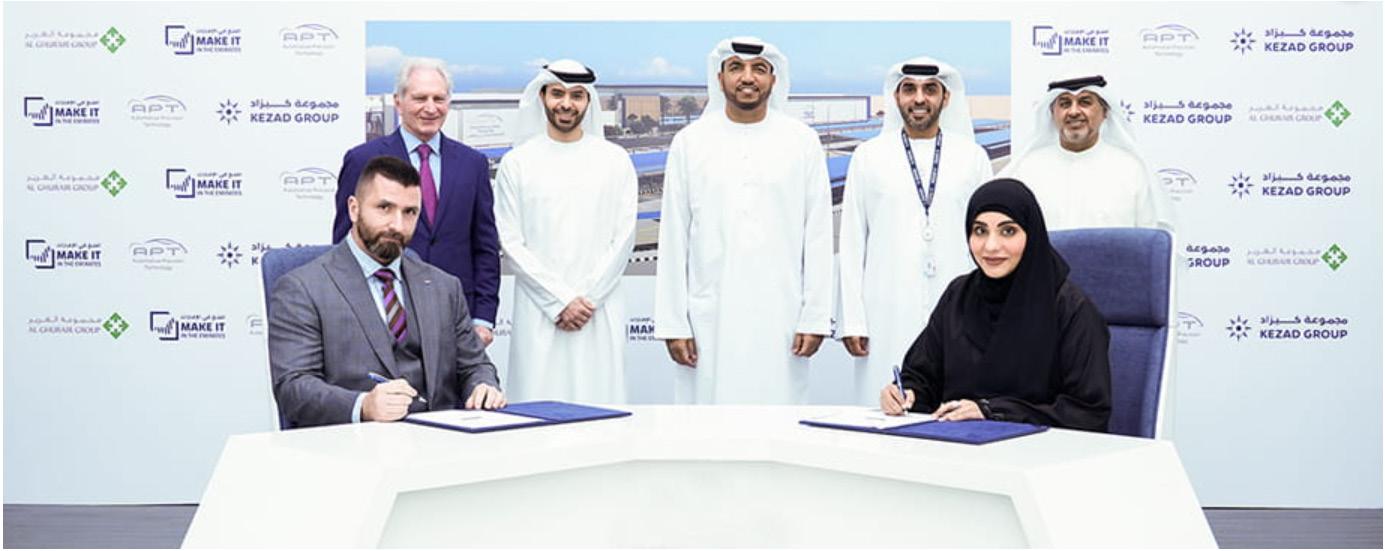
Deftly weaving real life stories of some of the most colourful figures from the time of World War II Paris with an ingenious art thriller plot that brings the narrative up to the high octane auction houses of today. In the Frame is a page-turning adventure that is at once historically fascinating and dramatically compelling. What were the links between Hermann Göring and Coco Chanel? What became of the Nazi’s hidden art plunders once they had been defeated? And what dark secrets must a new generation confront to get to the ingenious truth behind the iconic artworks we see in our galleries today? This passionate celebration of art history’s intrigues, conjured from fact and fiction, is an adventure to delight and entertain.
To secure a copy of the book, contact the author by email at: lorraineamrani@gmail.com
Available from Nomad Publishing https://nomad-publishing.com/in-the-frame.html#
For more information visit www.lorraineamrani.com
For more visit: lorraineamrani.com




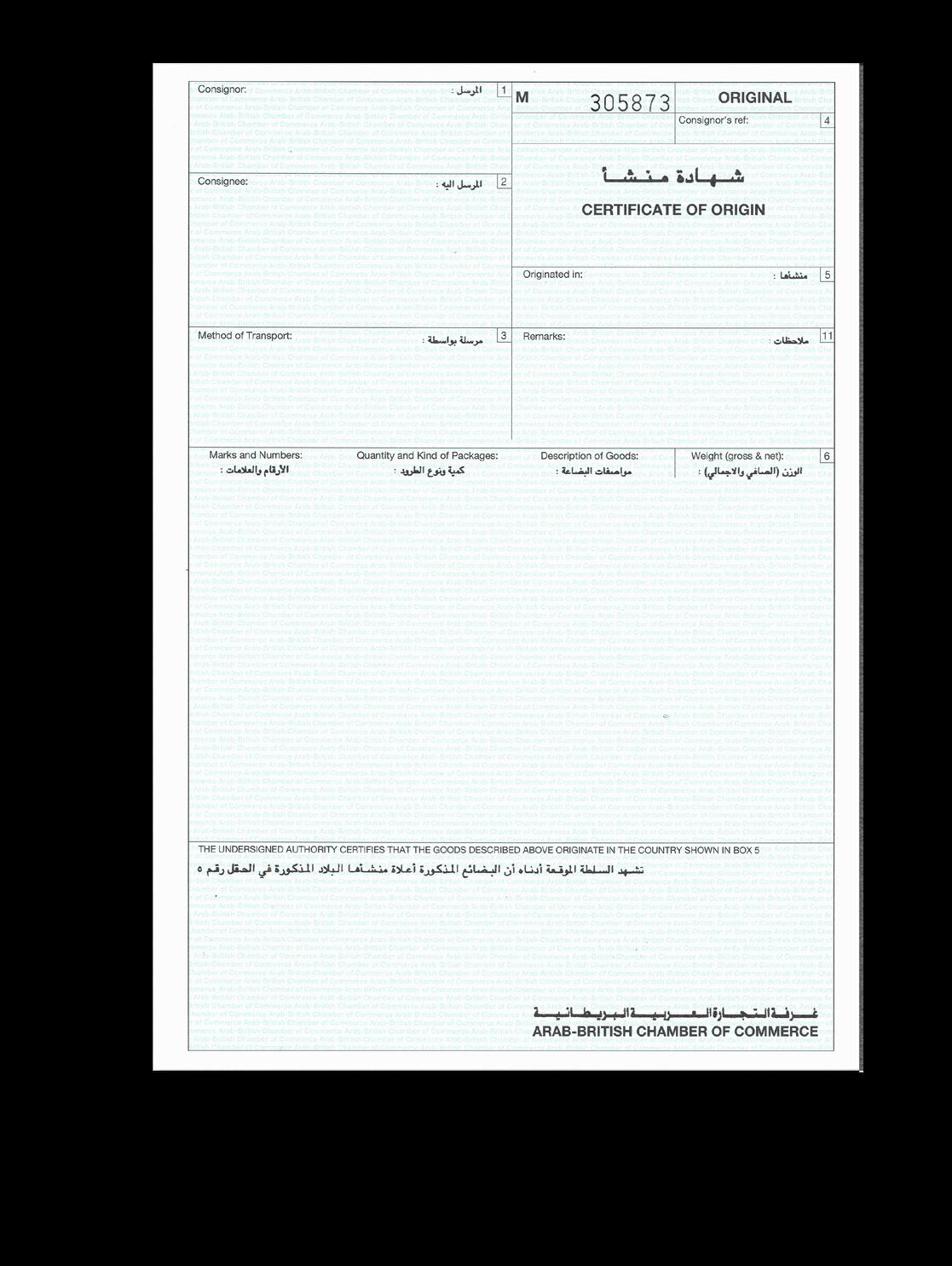
Surrounding the uncertainty of Brexit, the Arab-British Certificate of Origin remains the certain method to trade with the Arab world. There will be no changes to the certificate, and the ABCC’s services will suffer no interruption irrespective of Brexit’s outcome.
The Arab-British Certificate of Origin remains the only certain, secure and reliable means of export documentation for companies trading with the Arab world. There have been no changes to the certificate, and, likewise, the ABCC’s range of trade services remain entirely unaltered in the post-Brexit trading environment.
We at the ABCC remain available to support your exporting and wider business needs.
We at the ABCC remain available to support your exporting and wider business needs.
www.abcc.org.uk
www.abcc.org.uk